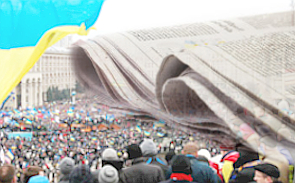
The reaction there is divided: some authors, influenced and pressured by Western sources, see these events one-sidedly. Others have a wider perspective, through the prisms of different aspects of the situation.
Abdel Bari Atwan, prominent opinion journalist and editor-in-chief of the online publication Rai al-Youm, deems the US and its Western allies’ reaction to Russia’s actions “hysteria.” The tone of their threats to apply sanctions against Russia sounds as if they were dealing with the island of Grenada, not a major power, he writes.
A number of Arab media and experts have compared the behavior of the Western media machine during events in the Ukraine with its role in the runup to the US armed invasion of Iraq in 2003. At that time, Washington was disseminating the thesis of a supposed buildup of weapons of mass destruction in Baghdad, which became the pretext for starting the war on Iraq. As a result of that intervention by the US and its allies in Iraq under this invented justification and “in the name of spreading democratic values,” many thousands of Iraqis were killed. In the wake of Iraq, there followed Libya and Syria.
The West’s multimedia outlets have recently exacerbated tensions, fomenting further unrest in Ukraine and a putsch against its legally elected president. It is no secret, underscore observers, that the main instrument of democracy is the voice of the voters in elections. But in the US, of course, other concepts operate. They incited the people to protest on squares in the center of Kiev with the aim of toppling a president who did not suit Washington’s needs. At the same time, everything possible is being done to polarize Ukraine, whose eastern part is populated by Russians and Russian language speakers, and to encourage nationalists, in order to expunge Russia’s historical influence from the nation’s memory.
America can hardly emerge victorious in the Kievan drama, Abdel Bari Atwan concludes, not because it is weak, but because its leadership is unaware of how the world has changed and that the USA is no longer the only superpower on the planet.
In a similar light, the publication Voice of Iraq notes that the US spent enormous efforts and finances on its struggle against its number-one enemy, Communism, during the Cold War years. Now Washington is trying to play the same card against Russia. But European countries are now somewhat more mature and independent in asserting their political, economic and other positions and aspirations. This is shown by the Ukrainian crisis, where many European countries, having their own interests which diverge from their transatlantic partner’s, do not recognize the “red line” that Washington has designated for them. The West, though it has an interest in depleting Russia’s strength in the Ukrainian crisis, still is not going to go to war with Moscow over the beautiful eyes of Kiev. It will merely resort to high-powered propaganda sallies and sanctions. But Europeans cannot agree on their size and scope, and the Russian Federation believes that the sanctions will boomerang back against their initiators.
The Qatari newspaper Al-Sharq warns of the negative repercussions of the Ukrainian crisis for the world economy and for the reforms currently needed in the governments both of major powers and of smaller countries. It will also aggravate the problem of the US and Eurozone countries’ heavy debt burden. This is not only an economic conflict, but also a conflict over the distribution of resources. With regard to the countries of the Near East, the excesses of the Arab Spring have brought an economic loss which has reached the figure of 800 billion dollars. Regardless of attempts by local governments to breathe new life into their economies, instability has become a disquieting feature of life in the region.
The escalation of economic opposition to the Russian Federation, in the view of Al-Sharq’s editors, will hinder the plans of the other major powers to generate nearly a trillion dollars in five years for the acceleration of economic development.
Yuri Zinin, Senior Researcher at MGIMO, exclusively for the online magazine “New Eastern Outlook”.
